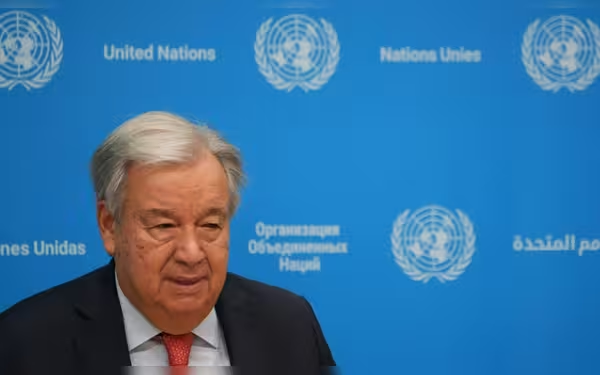Saturday, November 16, 2024 05:28 PM
UN Chief Calls for Global Unity on Pact of the Future
- UN urges nations to approve 'Pact of the Future'.
- Guterres warns of existential risks without cooperation.
- Summit aims to reform global governance structures.
 Image Credits: arabnewspk
Image Credits: arabnewspkUN Secretary-General urges nations to unite for the 'Pact of the Future' to tackle global challenges like climate change and AI.
The United Nations has long been a platform for global dialogue, addressing pressing issues that affect humanity. Recently, the UN Secretary-General, Antonio Guterres, has called upon the world’s nations to come together and approve a crucial document known as the "Pact of the Future." This blueprint aims to tackle a range of global challenges, including conflicts, climate change, and the rapid advancement of artificial intelligence (AI). As the world faces unprecedented transformations, the urgency for cooperation among nations has never been more critical.
During a press conference, Guterres emphasized that discussions surrounding the "Pact of the Future" are nearing completion. He expressed concern that failing to achieve consensus among the 193 UN member nations would be a "tragic" outcome. The pact, which has undergone four revisions, is set to be discussed at the upcoming Summit of the Future, where world leaders will gather to address the pressing issues of our time.
Guterres has previously warned about the survival of humanity and the planet, urging leaders to unite and take action. The Summit of the Future, scheduled for Sunday and Monday, aims to reform the UN and other institutions established after World War II, adapting them to meet new global threats. The draft of the "Pact of the Future" outlines 51 actions that focus on eradicating poverty, combating climate change, achieving gender equality, promoting peace, and protecting civilians.
One of the key points raised by Guterres is the need for reform in global governance. He stated, "In every area — from climate to AI — there is a serious problem of governance." This highlights the importance of not just identifying challenges but also implementing effective solutions. The draft warns of "rising catastrophic and existential risks" that could lead to a future filled with crises if not addressed promptly.
Among the notable aspects of the pact are potential breakthroughs in Security Council reform and measures to govern new technologies like AI. Guterres pointed out that these developments represent a significant step forward in international cooperation. He urged member states to push the "Pact of the Future" across the finish line, stating, "We can’t create a future fit for our grandchildren with systems built for our grandparents." This statement encapsulates the need for a forward-thinking approach to global governance.
US Ambassador Linda Thomas-Greenfield echoed Guterres' sentiments, emphasizing the Biden administration's commitment to creating a more inclusive and effective international system. However, she also noted that there are still significant differences among member states, particularly with Russia and Saudi Arabia expressing concerns over various issues within the pact. Despite these challenges, Thomas-Greenfield remains hopeful that progress can be made.
The "Pact of the Future" represents a vital opportunity for nations to come together and address the pressing challenges of our time. As the world continues to evolve, it is imperative that global leaders prioritize collaboration and reform to ensure a sustainable and prosperous future for all. The upcoming Summit of the Future will be a critical moment for the international community to demonstrate its commitment to these ideals, paving the way for a more united and resilient world.













